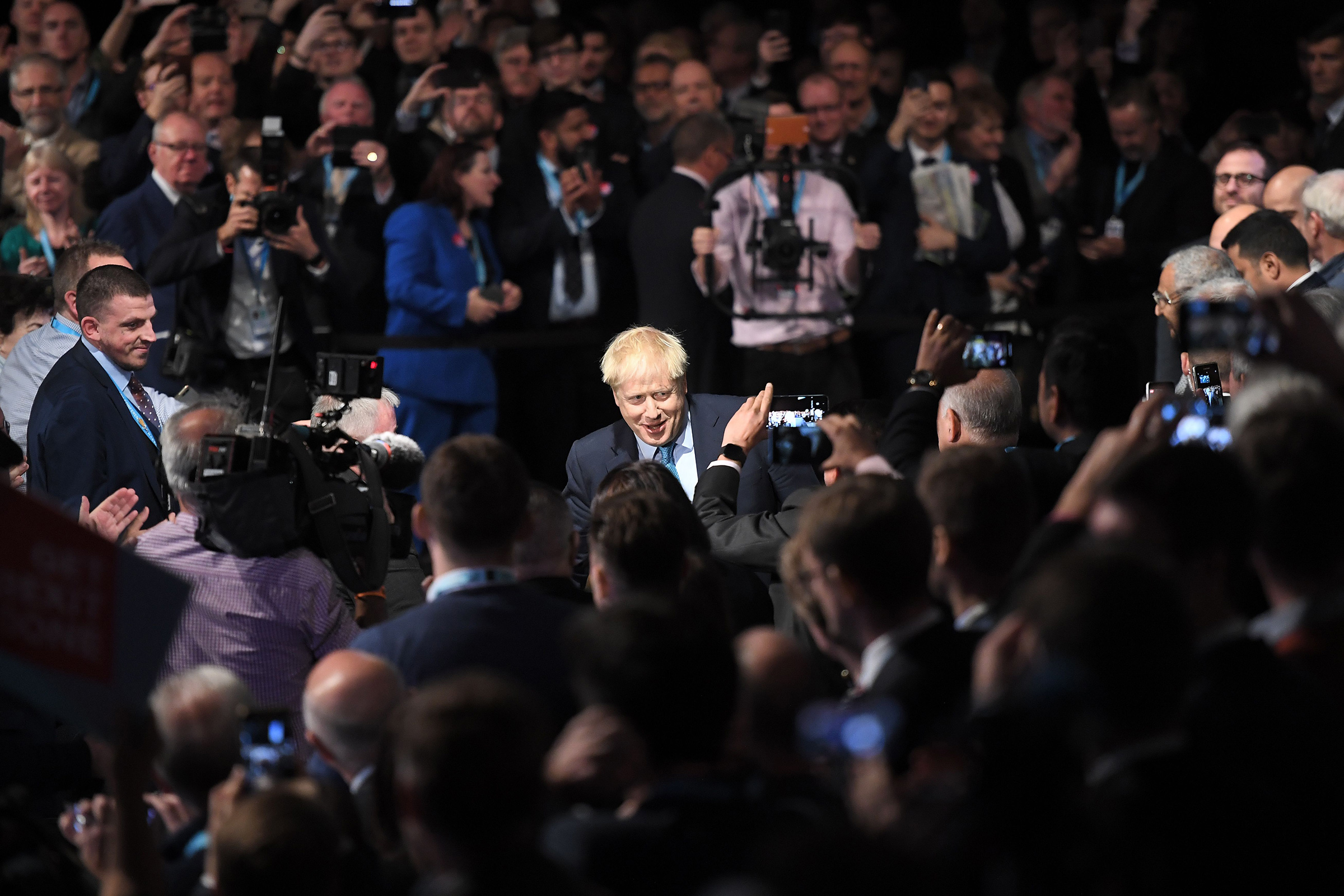
A long standing ovation greeted U.K. Prime Minister Boris Johnson as he appeared onstage in Manchester on the final day of the annual Conservative Party conference on Oct. 2. It was his first speech to his party membership as Prime Minister, and he brought the gusto his right-wing base has come to expect, pledging to deliver Brexit, reinvigorate the national economy and fire the leader of the opposition into orbit.
But despite the adulation of loyal supporters here, Johnson’s future looks less certain than ever. He not only looks increasingly unable to make good on his promise to deliver Brexit by the Oct. 31 deadline, but also is in danger of losing political standing ahead of a seemingly inevitable early election because of two emerging scandals about his personal conduct while in positions of power.
One dates from his time as mayor of London in the early 2010s and involves his relationship with former model Jennifer Arcuri, who allegedly told friends she had a sexual affair with Johnson while he was married. Officials are investigating reports Arcuri improperly received government money, including two grants totaling £11,500 ($14,000) from a public fund managed by Johnson at the time. Both he and Arcuri deny any impropriety.
The second scandal stems from new allegations, published on the eve of the conference, that in 1999, when he was editor of the Spectator magazine, Johnson groped the upper thigh of journalist Charlotte Edwardes under a table at a dinner. Johnson’s office said the incident never happened, but his Health Minister said he felt Edwardes was “trustworthy.” The allegation has also renewed attention on the Prime Minister’s past indiscretions, which include a number of extramarital affairs and at least one child born out of wedlock.
On the conference floor, Johnson’s party faithful were happy to ignore the new allegations, so long as he could deliver Brexit. “My honest view is: Who cares?” responded one delegate. “The only reason it’s coming up now is people who are trying to stop Boris Johnson in his tracks.” Established members of the party also smelled a conspiracy. “He’s under attack from all sides from people who wish to prevent Brexit,” Geoffrey Van Orden, a senior Conservative lawmaker in the European Parliament, told TIME. “The sources of these accusations are people who want to destabilize Boris’ government and distract people from his main task.”
In his speech, Johnson suggested dark machinations were at work. “[People] are beginning to suspect that there are forces in their country that don’t want Brexit delivered at all,” he told the crowd, to a thunderous response. “Within the Conservative Party it’s clear he’s their champion,” says Tim Bale, professor of politics at Queen Mary University of London, “partly because he’s been offering them everything they’ve ever wanted on Brexit. In spite of all the allegations about his personal life, he still remains very popular. In the same way they do with Trump, people dismiss the sexual-impropriety allegations as either unbelievable or unimportant.”
Yet polls show Johnson’s popularity in the country as a whole is waning. A majority (55%) is now dissatisfied with him as Prime Minister, up 17 points from July, according to a poll by Ipsos Mori published on Sept. 30. Women, in particular, are turning against him. According to a YouGov poll published on Sept. 27, 47% think he is “dislikable,” a 7-point increase from late August. The more recent allegations may drive that figure even higher.
Such a change will matter if, as widely expected, a general election takes place in the U.K. this winter. Although Johnson pledged onstage to ensure Brexit happens on Oct. 31 “come what may,” he is legally unable to do so unless he manages to strike a new, last-minute deal with European leaders. If he fails and Parliament forces him to seek another extension to the deadline, an election may follow that Johnson’s advisers believe he could win by casting himself as the victim of a cabal that wishes to stop Brexit at all costs.
His die-hard supporters may demand a greater sacrifice. Fifty percent of Conservative voters would prefer he break the law to force a “no deal” Brexit rather than ask for a further delay, according to a YouGov poll from Sept. 9. That might leave him in a jail cell or worse, said Dominic Grieve, a lawmaker Johnson expelled from the parliamentary party for rebelling against the government. “Ultimately, the Queen would dismiss him … She’s not going to have a Prime Minister who breaks the law. This is fundamental.”
Just two months into his premiership, Johnson’s grip on the keys to 10 Downing Street seems more tenuous than ever. But in his conference speech he betrayed barely a hint of concern, tossing out jokes and red-meat slogans to rapturous applause. Yet for all the bellicose rhetoric, there were hints of conciliation too. “This is not an anti-European party, and it is not an anti-European country,” he told the crowd. “We love Europe. We are European.”
In Johnson’s whole speech, they were virtually the only sentences greeted by silence.
More Must-Reads from TIME
- Donald Trump Is TIME's 2024 Person of the Year
- Why We Chose Trump as Person of the Year
- Is Intermittent Fasting Good or Bad for You?
- The 100 Must-Read Books of 2024
- The 20 Best Christmas TV Episodes
- Column: If Optimism Feels Ridiculous Now, Try Hope
- The Future of Climate Action Is Trade Policy
- Merle Bombardieri Is Helping People Make the Baby Decision
Write to Billy Perrigo/Manchester, U.K. at billy.perrigo@time.com